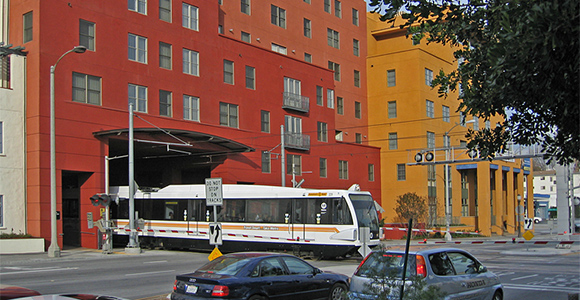
Transit-oriented housing in Pasadena (Photo Credit: Brett VA/Flickr)
Affordable housing is such a hot topic in Pasadena that it was the single subject of a city council candidate forum last night. Eight candidates, including two incumbents, from two of the city’s contested districts were on hand to discuss the topic of affordable housing and which policies they would support if elected.
Pasadena, a suburb of Los Angeles, has a median home value of $726,500 and the average rent of $2,129 for a one-bedroom unit and $2,651 for a two-bedroom. Like much of the state, the city is unaffordable to those living on a moderate to very-low income.
Pasadena has taken an aggressive approach to tackling the housing crunch as it is one of the few cities in the area to have an inclusionary housing ordinance (15 percent). Additionally the city announced late last year that their latest survey showed there were no homeless families on the street, crediting the city’s Housing First Program. The city has also included affordable housing in the housing element of its most recent General Plan, specifically mentioning opportunities for new development of market and affordable housing in transit districts along the Metro Gold Line.
“It is one of the few cities in this part of the county that has done its part on affordable housing — for sale, for rent, and for low, moderate and very-low levels,” said Councilman Victor Gordo, an incumbent running for District 5.
Candidates were asked about their views on tenant protections, land requirements within districts for affordable housing, increasing the city’s inclusionary policy, environmental impact reports for affordable housing development and the use of surplus city property for affordable housing. Most of the candidates favored tenant protections, but not rent control, which isn’t a Pasadena ordinance. Only one of the candidates approved of using surplus city property for housing, while the others wanted to wait to hear from their constituency.
The candidates also heard from residents who are struggling to afford homes in the area. Patrice Marshall McKenzie grew up in Pasadena and is a public affairs professional, but she and her husband are still unable to buy a home in the city. She said their income is too much for assistance, but they can’t swing the down payment on their own.
“There needs to be more reasonable income limits and really take into consideration the price of property here in California, especially in Pasadena, so that it encompasses professionals,” said Marhsall McKenzie. “Because if we want our school teachers, our librarians, the police and fire department, our emergency personnel employees to be able to live in the community where they work and serve, we’ve got to be able to create opportunities to purchase homes.”
Sheena Tahilramani, a candidate for District 7, agreed that young people are having trouble buying homes: “I can’t afford a house. I’m 34 years old. I can’t afford it.”
Tahilramani said she against the regulation of short-term rentals, currently being considered by the city. “One of the things we’re talking about here is a limitation of short-term rentals, such as AirBnB, what I don’t think some of the city council realize is some of us are actually utilizing that to make housing more affordable,” said Tahilramani.
Earlier in the week, the Pasadena City Council approved an amended dwelling ordinance to comply with state law when SB 2299 and AB 1069 went into effect. These two bills were among many championed last year by the California Economic Summit’s Housing Action Team as legislation that could provide more sources of housing throughout the state. The Summit last year also hosted a series of convenings with a diverse group of leaders to craft an “all of the above” framework for expanding access to subsidized affordable housing while also increasing production of market-rate housing near jobs and transit
Gordo summed up the role of the Pasadena City Council saying, “As local elected officials, we have a responsibility to insure that our city does its part, but also to encourage other city leaders in the region to do their part and to ensure that the state and, hopefully, the federal government will do its part because no one city, no branch of government can solve this problem or even address this problem in a competent way, we all have to pull together.”

